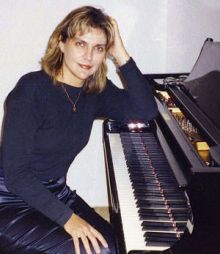Liudmyla Yurina is a representative of the “middle generation” of Kyiv School of Composers. Her music is well-known in Europe and the US. Yurina often goes to the Western countries, brings to Ukraine interesting music projects involving both, composers who create new kind of music, and foreign musicians working in this sphere. Recently concert of Swiss-German duo of trombonist Dirk Amrein and pianist Jurg Henneberger (musicians played a musical piece by Yurina among other European music).
Mrs. Yurina, in your opinion, is serious new music in demand among the audience?
“Classical music will always be in demand, this also applies to modern music, despite the first impression of the complexity of language and confusing message of an author. There is a layer of intellectuals in need of hearing both classic and contemporary music. For example, in Europe Pierre Boulez and Helmut Lachenmann, as well as John Adams and John Corigliano in the US have their audience, which is constantly increasing. We have the same situation despite the fact that traditions of the Soviet music are still alive. We recently spoke with Vladimir Tarnopolsky at the Moscow Conservatory that for any changes to take place in music we need to educate the younger generation of the musicians who would be looking for something new and would not confuse the notion of ‘creative search’ with rehashing somebody else’s motives and with endless repeating of someone’s creative ideas.”
Now Ukrainian music is dominated by small compositions and small forms. Is this due to a lack of orders? Do composers have a need to make music of large forms?
“We have practically no direct orders. A lot of symphonic music is being made and organizers of festivals are not always able to satisfy all the requests from authors for its performance. However, opera and ballet are a sore spot: many pieces are composed but very few are played on a stage. Here we touch upon the repertoire policy of theaters, besides it requires high financing. Chamber music is good because it makes it easy to arrange concerts and requires less finance.”
You teach composition at the National Music Academy of Ukraine. Do students choose their professor depending on the trend or style in which the master works?
“It all depends on kind of music that the student is most fond of. It is good when a professor can understand the desire and intention of a student. Sometimes a student gets to work with a professor he chose, but often the department ascribes him to a professor who just does not have enough teaching load. As a rule, teachers teach students to write music of different genres. It all depends on the flexibility and the ability of the professor to adapt his pedagogical methods, his desire to see and develop his students’ talent. Another issue is the level of knowledge about the contemporary music a student possesses. Introducing and implementing anything new in Ukraine requires tremendous efforts. However, several years ago as a special concession for student composers I developed a course for one semester. It is taught in the last year of studies. Young composers study music of Karlheinz Stockhausen, Gyorgy Sandor Ligeti, Wofgang Rihm, Helmut Lachenmann, John Cage, Iannis Xenakis, Luciano Berio, Luigi Nono, Brian Ferneyhough, and others – ‘little gentleman’s set’ which every graduate of music school should know. This is a huge layer of world’s culture. Besides, the course on modern music should include multimedia projects, for example, video operas, which are now very popular in Europe. This also requires additional study time. Recently we have watched a multimedia opera An Index of Metals by Fausto Romitelli.”
Please tell us about your training at Stanford University.
“I traveled a lot around Europe but the experience of going to the United States is special. Fulbright Foundation provided a unique opportunity to receive training at the famous Stanford University, located in the famous Silicon Valley. This is Mecca of computer technology, the symbol of all that is new in modern America. I was happy to meet and make friends with John Chowning and Chris Chafe, to listen to my own music on my debut solo concert at the University of Texas. I lived in Palo Alto – the place that famous Steve Jobs and Mark Zuckerberg also chose as a place of residence. I was able to plunge into fascinating and diverse American culture. These were memorable and bright impressions that inspired a lot of new ideas and projects, which I want to implement in Ukraine.”
The Day’s FACT FILE
Liudmyla Yurina – composer, born in 1962 in Uzin (Ukraine). Graduated from the Kyiv Musical College (piano), Composition Department of the Pyotr Tchaikovsky Kyiv Conservatory. Defended Ph.D. work (class of Yevhenii Stankovych). Attended seminars held by Paul-Heinz Dittrich, Irvine Arditti, Helmut Zapf, Gerhard Staebler, Duran, Helmut Lachenmann, and Wofgang Rihm (Germany).
Since 1993 member of the organizing committee and the coordinator of the International Forum “Music of Youth” in Kyiv. Since 1995 worked at the Composition Department, National Music Academy of Ukraine. Was a guest composer at the flute master class in Rheinsberg Music Academy (1999), lectured at universities in Germany and the US. Received creative residence and grants in Germany and Sweden. In 2010 received Fulbright scholarship for an internship at Stanford University (CCRMA, US).
Yurina’s music is performed in Ukraine, Russia, Germany, France, the US, Canada, Italy, Finland, Poland, etc. She actively cooperates with well-known European and American artists. She has performed on radio stations Deutsche Welle (Germany), the Ukrainian Independent Radio (Chicago, US), Edmonton (Canada), Ukrainian National Radio, etc. Her music work was published by publishing houses Muzychna Ukraina and Frederic Harris Music Publishing (Canada).







